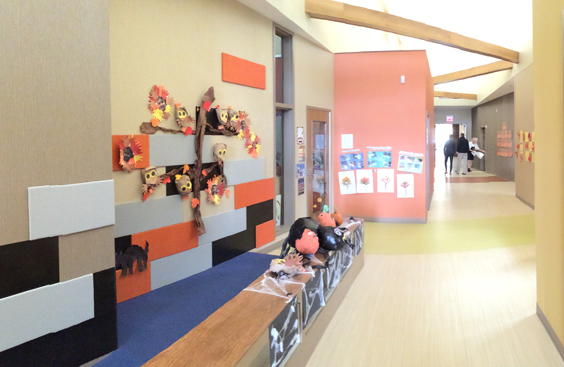“The four hills of life that we all have to walk. . .
First Hill—personal self, developing the personal gifts
Second Hill—finding a life partner, making a commitment and responsibility for our children
Third Hill—responsibility for grandchildren, help them walk the road of life
Fourth Hill—responsibility for great grandchildren . . . laying down footprints for others to follow.”
Reuben Snake (1937-1993—Winnebago Tribal Leader and Activist)
Deliah Kearnes knew something remarkable had happened when her daughter recently told her what she wanted to do when she grew up. For months, Kearnes had watched anxiously as her child struggled to learn and develop a sense of belonging in a child care setting. When the new Educare Winnebago opened its doors earlier this year, however, that began to change. Kearnes enrolled her daughter in the program, and started to see an entirely new level of enthusiasm for learning. Then, one day, her daughter announced what she hoped the future would hold for her: “I want to be a teacher at Educare!”
Special urgency
A deep love of learning is something to be cherished and nurtured in young children no matter where they live. But in the Winnebago community, this has a special urgency. Families living on this tribal Reservation in rural Thurston County face some of the biggest obstacles in Nebraska when it comes to providing stimulating, developmentally positive early learning experiences for their youngest children.
While unemployment rates are improving on the Reservation, approximately 44% of the Native American population lives at or below the federal poverty level. When parents struggle to provide even the most fundamental necessities for their families, children are more likely to fall behind in cognitive, social-emotional and even physiological development during the crucial early years of life.
The grand opening of the new Educare school at Winnebago last week celebrated a significant step forward for this community’s youngest, most vulnerable children. As many as 191 infants, toddlers and preschoolers will attend the school when it’s operating at full capacity.
Evidence-based, quality care
Like every Educare school, Winnebago’s early learning program is built upon evidence-based practices, policies and quality standards that are proven to advance cognition, language acquisition, and positive social and behavioral skills. Family engagement specialists on staff work directly with parents to strengthen their skills as caregivers and educators, and deepen their knowledge of their children’s developmental needs. The best evidence shows that the presence of these assets during a child’s earliest years can have a profound influence on their life trajectories well into adulthood.
Educare Winnebago is the first and (currently) only school in the Educare network to focus on the unique needs of families and children in a tribal community. From the physical design of the building, to the early learning program housed within, Educare accommodates and reflects the culture of the Winnebago people. Native art and artifacts adorn the walls, and the teaching staff routinely organizes children’s activities and experiences to connect them to their tribal language and heritage. In turn, this creates a more welcoming environment for parents, and encourages them to be active participants in school activities and their children’s early education.
 That sense of local engagement is also reflected in the partnership that made this Educare possible—a collaboration between the Winnebago Tribal Council, Winnebago Public Schools, Little Hill Child Development Center and the Winnebago Head Start Program. The insight, knowledge and resources of these local partners, combined with the support of the Buffett Early Childhood Fund, the Ounce of Prevention Fund and other national-level partners, make the opening of Educare Winnebago a milestone in the lives of children and, arguably, in the history of the tribe.
That sense of local engagement is also reflected in the partnership that made this Educare possible—a collaboration between the Winnebago Tribal Council, Winnebago Public Schools, Little Hill Child Development Center and the Winnebago Head Start Program. The insight, knowledge and resources of these local partners, combined with the support of the Buffett Early Childhood Fund, the Ounce of Prevention Fund and other national-level partners, make the opening of Educare Winnebago a milestone in the lives of children and, arguably, in the history of the tribe.
Hope for the future
Speaking at the grand opening, Portia Kennel, executive director of the national Educare Learning Network, said a common sense of responsibility to children, and hope for the future make Educare and the Winnebago people a perfect fit for one another. “It is hope that built this school, the unseen thing that was in this place that helped it come about . . . the hope and dream that this community has something better for its children,” she said.
That kind of hope can be heard clearly in one little girl’s aspiration to teach at Educare Winnebago when she grows up. It shows that an enthusiasm for learning is infectious; it wants to be shared—and the earlier this happens in a child’s life, the better. When parents, professional educators and entire communities unite to cultivate that quality in their youngest children, they create momentum that carries the current generation forward, and set a precedent for future generations to follow.



